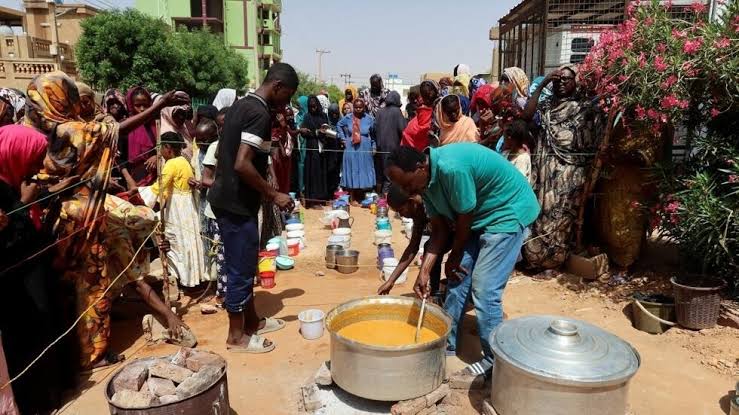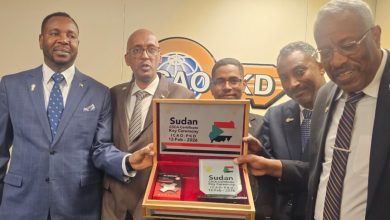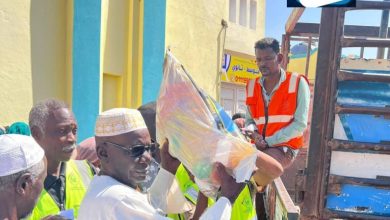Reports
Sudan’s Unsung Heroes: Why Emergency Response Rooms Deserve a Nobel Peace Prize

By Rawan Al-Siddiq
On October 3, 2024, the Peace Research Institute Oslo (PRIO) announced the nomination of Sudanese Emergency Response Rooms (ERRs) for the Nobel Peace Prize.
With reports indicating that 150,000 people have died in Sudan (potentially more), over 12 million displaced, and the worst famine the world has seen in 40 years, the 543 days of armed conflict have caused the world’s worst humanitarian crisis. However, international responses have been insufficient, reflecting that the dedicated pursuit of ending the war peacefully may not be a top priority on the global agenda. While the war continues and peace talks are in their preliminary stages, the affected remain suffering in silence. Amid the destruction, there are those who stand with the community, risking their lives to help war victims who have no access to life’s necessities, using innovative networks to ensure the survival of populations who may not see peace in their lifetime.
The story of Sudanese Emergency Response Rooms (ERRs) is one of struggle, sacrifice, creativity, and, most importantly, hope. This grassroots network, composed of hundreds of humanitarian units organized to meet local humanitarian needs, has managed to sustain a support system while international organizations faced bureaucratic, geographical, and security obstacles. Their compassion and resilience reflect a new model of humanitarian aid that prioritizes local victims and overcomes many logistical challenges. Their work is crucial and deserves full recognition and support; the Nobel Peace Prize represents the perfect opportunity to enhance international solidarity with Sudan during this time of devastation, reducing the suffering of war and accelerating the peacebuilding process.
The Nobel Peace Prize and Humanitarian Work
According to Alfred Nobel, the purpose of the Nobel Peace Prize is to elevate those working for “the fraternity between nations, for the abolition or reduction of standing armies, and for the holding and promotion of peace congresses.” Since that vision was expressed in 1895, wars have been plentiful, but equally, there have been inspiring efforts to support communities and victims in the form of humanitarian work.
Sudanese Emergency Response Rooms: Humanitarian Work That Inspires
Organized by geographic region, Emergency Response Rooms are currently the backbone of humanitarian assistance in Sudan. Food, water, shelter, and social care are secured and distributed within local communities by volunteers. Moreover, their bases serve as evacuation routes, medical points, and community gathering places for those trapped by the conflict.
The success of the ERRs can be attributed to their horizontal, decentralized structure that prioritizes addressing local damaged infrastructure and suppliers. This structure allows for tailored strategies suited to the specific conditions of each region, where volunteers make careful observations of the reality on the ground and enhance coordination between different units.
Another unique feature of the ERRs is the youth who make up the majority of the volunteers. Sudanese youth have long shown a desire to serve their community and protect it from harm. From student activism in the 1960s to the deaths of young activists and volunteers in 2019, Sudanese youth have tirelessly worked to sustain their community during times of conflict and are the cornerstone of the country’s self-help tradition. This tradition dates back to the “Nafeer” campaigns, a youth movement that led community assistance efforts during the floods of 2013, 2016, and 2020, as well as the COVID-19 pandemic, allowing them to learn from past experiences. Amidst a severe resource shortage, the ERRs recently organized and supported the transport of victims during the devastating floods of late summer. By focusing their efforts on the intricate details of humanitarian work in Sudan, the ERRs offer an alternative model that has bypassed the bureaucracy that typically hinders institutional counterparts.
The work of ERR members requires immense mental strength, compassion, and bravery; they operate in dangerous and difficult conditions. They face threats of violence, theft, and kidnapping, as warring parties target not only their resources but also their lives when they learn of the foreign donor funding they receive, in a clear attempt to isolate them from the international community. Additionally, their work is characterized by self-reliance and the ability to sustain humanitarian projects for extended periods, aiming to reduce dependency on the unstable international system. This work deserves Nobel recognition, especially in light of important discussions around food aid undermining local food economies, a topic raised after the World Food Programme won the Nobel Peace Prize in 2020, emphasizing the importance of strengthening local efforts and collaborating with regional actors.
Sudan’s Emergency Response Rooms are at the forefront of humanitarian work during the Sudanese conflict, embodying many humanitarian principles outlined in the Geneva Conventions of 1949, which celebrate their 75th anniversary in 2024—making this the perfect time to recognize and support their work.
The Nobel Peace Prize for the Emergency Rooms is a Nobel Prize for Hope
There are three tangible, symbolic, and moral ways in which the Nobel Peace Prize can make a difference for Sudanese ERRs and their work.
Sudan needs immediate action. Previous gatherings of civil society actors and concerned organizations have called for actions that match the context, emphasizing that the primary goal in addressing Sudan’s humanitarian situation is to adopt a bottom-up approach. ERRs are well-positioned to achieve this goal—their proximity to the conflict parties and its victims means they also play a role in peacebuilding. The social and political capital that comes with the Nobel Peace Prize can carry convincing weight in negotiations with the conflict parties, just as Mario Vargas Llosa used his status to pressure the Peruvian government for restorative justice for victims of internal conflict. Moreover, the ERRs’ potential for knowledge sharing is significant. It is known that Nobel Peace Prize laureates, through their unique profiles and humanitarian work methods, can embed international standards into the fabric of international law. If the Sudanese ERRs are awarded the prize, their methods of meeting humanitarian needs during crises can be highlighted as part of a broader mainstreaming of grassroots reliance in international relations. It has become evident that international law has failed to protect Sudanese people in many ways—conceptual notions such as the Responsibility to Protect are heard only in declarations and are not practically implemented. Where Sudanese people experience the results of these principles is in the work of the ERRs; it is time for the international humanitarian system to absorb and integrate the strategies and frameworks of Sudanese ERRs.
Conceptually, honoring the ERRs can be part of a larger shift in how humanitarian work is done, especially in places like Sudan with similar historical and social backgrounds. As Professor Francis Sejersted, a former member of the Norwegian Nobel Committee, noted in his speech at the Nobel Prize ceremony in 1999, awarding the Nobel Peace Prize for the first time to Henry Dunant, co-founder of the Red Cross, in 1901 was one of “the most important decisions in the prize’s history.” As the nature of wars changes, so does the nature of aid provided to their victims. The Nobel Peace Prize evolves in parallel with the landscape of conflicts and peace projects worldwide, as evidenced by the decision to award the prize to Doctors Without Borders in 1999 after witnessing violations during their work. With the increasing localization of humanitarian projects and networks in war-torn countries like Sudan, the committee now has the chance to reflect this new form of fraternity among people. This can help legitimize the work of the ERRs, raise their international profile, and provide a platform for partnerships and global cooperation that will materially support their work. Furthermore, it can contribute to shifting some of the symbolic power usually concentrated in international humanitarian institutions towards entities that do not fit into traditional institutional molds, legitimizing the efforts of the Sudanese ERRs and making them part of a broader process of decolonizing and localizing humanitarian projects in Sudan.
Finally, highlighting the efforts of the ERRs provides crucial moral support. At a time when humanitarian crises are competing for international attention, amplifying Sudan’s human experience on the global stage is critical. ERR volunteers have testified that military parties and militias deliberately target them and seize their resources when they discover the financial support they receive from abroad. These tactics aim to isolate them from the international community. The international community cannot allow this to happen. Awarding the Nobel Peace Prize to ERRs could reignite the spirit of solidarity and support that they desperately need.
Sudanese Emergency Response Rooms Embody Everything the Nobel Peace Prize Stands For
The Nobel Peace Prize has seen historical moments that have served as catalysts for acknowledging and rediscovering the forgotten human element in wars. While peace is often crafted by states, diplomats, intergovernmental organizations, and other political actors in the theater of war, humanitarian work remains closest to those with the greatest stake in peace: people.
The ERRs in Sudan have accomplished what sometimes seemed unachievable during a bloody and senseless war—they put the Sudanese people first. By mobilizing in an innovative, locally responsive way, and drawing on Sudan’s rich history of mutual aid and cooperation during times of crisis, they have managed to meet the urgent humanitarian needs of the victims of the world’s worst humanitarian crisis. This remarkable display of humanity by unsung heroes deserves recognition and the ensuing support—they are deserving of the world’s highest honor.



